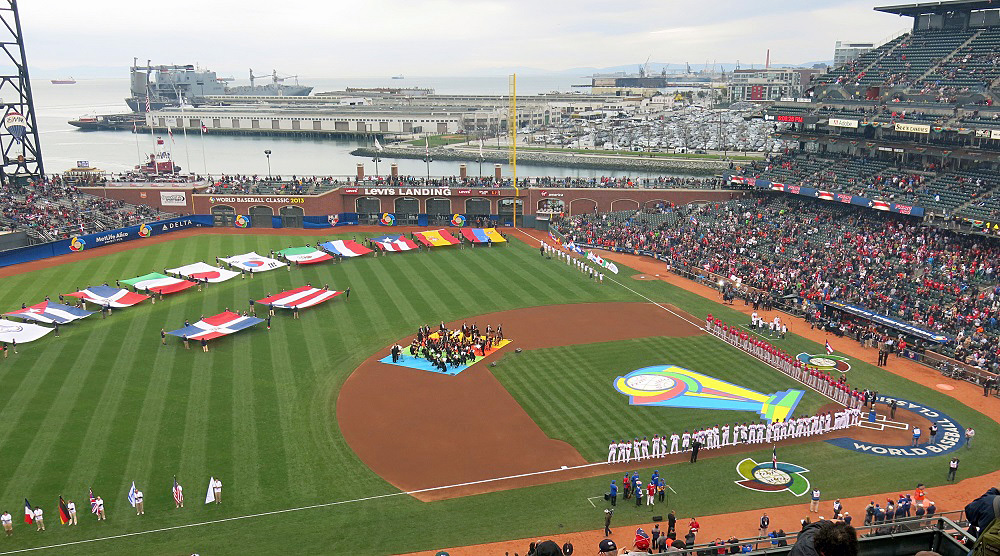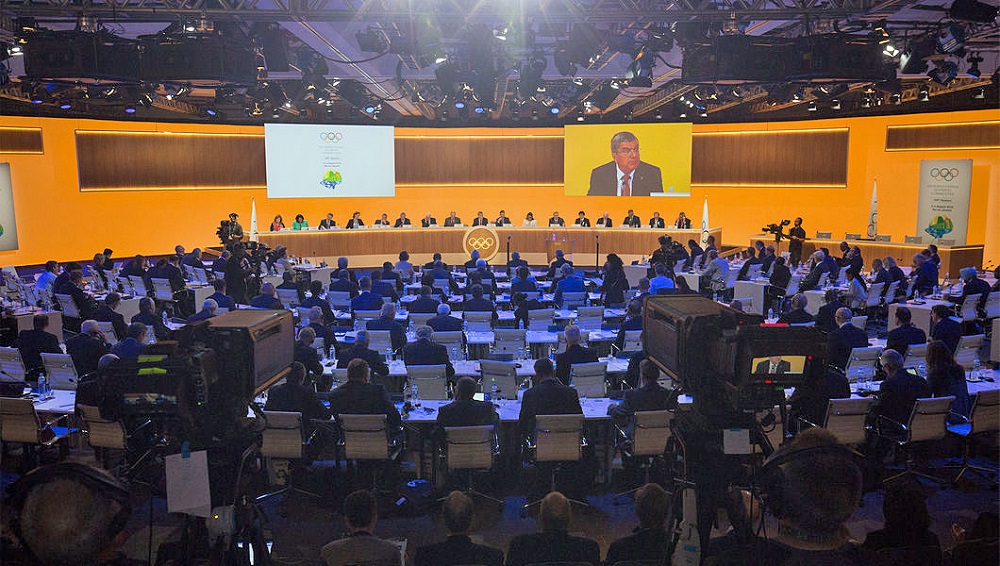It’s one of those things that if you have ever attended one you cannot say enough good things about it. In fact, in many cases, they even hold their workouts during MLB’s spring training at MLB spring training facilities … say, like Camelback Ranch in Glendale, Arizona or Historic Dodgertown in Vero Beach, Florida.
I am, of course, referring to the World Baseball Classic or WBC as it is more popularly known.
The good news is that it’s happening again – the fourth such one – in March of 2017.
The bad news is that the 2017 WBC will, in all likelihood, be the last one.
On Monday afternoon, MLB Network Radio’s Round Trip co-host Jim Bowden hinted (with good cause) that the 2017 WBC will probably be the last one. And while this is indeed bad news for fans of the WBC – and there are many – the Championship Round will be held at Dodger Stadium March 20-22, 2017
But how can something so incredibly popular be on the verge of extinction, you ask? As Maverick said in the hit 1986 movie Top Gun, “This could be complicated.”
Despite its tremendous popularity, especially in places like Japan, South Korea, the Dominican Republic and Puerto Rico, the WBC has always pretty much been a flop in the United States, where much (most) of the sponsorship money is generated through Major League Baseball. And though the Championship Rounds generally draw well, the earlier qualifying rounds usually do not. As such, MLB – which plays a very significant role in the administration of the WBC – hasn’t done quite as well as it had initially hoped it would.

Under gloomy skies the 2013 WBC Final drew a crowd of 35,703. The seating capacity of AT&T Park is 40,800.
(Photo credit – LiAnna Davis)
It’s no mystery as to how and why the WBC came into existence. When the International Olympic Committee (IOC) voted (in 2004) to eliminate baseball (and women’s softball) from Olympic competition following the 2008 Games in Beijing, China, much of the world was incensed; so much so that MLB, the Major League Baseball Players Association (MLBPA) and the Japanese Professional Baseball Players Association (JPBPA) immediately began working on a new worldwide organization appropriately named the World Baseball Classic. In fact, the first WBC tournament was held in 2006 even before the IOC did away with the two sports following the 2008 Summer Games, although it was not well represented, promoted or attended. But all of that changed – almost overnight – after the IOC dropped baseball and softball from their program.
The WBC gained significant national and world attention in 2009 when the Championship Round was held at Dodger Stadium. In that exciting final round, Team Japan defeated a very formidable Team South Korea. But even after winning their second consecutive WBC title (the also won in 2006), things did not sit well with the JPBPA over revenue sharing.
The JPBPA was demanding a larger share of advertising and merchandise revenue from the tournament, a large chunk of which came from Japanese companies. MLB declined to do so primarily because the 2009 WBC was a joint production between MLB and the MLBPA and bore the brunt of the cost to put on the quadrennial tournament.
In July of 2012 the JPBPA voted unanimously to boycott the upcoming 2013 WBC. The move was an obvious attempt by the JPBPA to pressure the MLB to readjust the revenue sharing. They did not. But when it became clear that the show was going to go on with or without Team Japan, the JPBPA finally agreed to participate after reaching a compromise with WBC organizers on the sharing of sponsorship and licensing revenues.
Putting money issues aside, at least for the moment anyway, without question the loudest argument against the WBC has been and continues to be its timing in relationship to MLB’s spring training, 162-game regular season and month-long postseason. Unfortunately, the simple truth is that there really isn’t a good time to have the WBC.
Oh sure, you can argue that the WBC could be held after the postseason, but by then every MLB player is flat out exhausted after a grueling 162-game season and in desperate need of using the off-season to recover from lingering injuries (or off-season surgeries) and then preparing for next season. There is also the issue of inclement weather in the U.S. during the winter months. And while the WBC is enormously popular in year-round weather paradises such as Puerto Rico, Venezuela and the Dominican Republic, hosting a tournament of this magnitude is cost prohibitive for these small island nations. (Already we’re back to the money).
The second loudest argument against the WBC is the risk of injury to its participants, especially to players whose teams have millions of dollars invested in them and especially before or during spring training when they may not be in game-shape yet. Sure, you can argue that baseball and injuries go hand-in-hand on every level of the game – from T-Ball to the Big leagues – but what if it happens to a team’s key player, as it did with Dodgers shortstop Hanley Ramirez during the 2013 WBC?
But are the timing and the risk of injury good enough reasons to eliminate something as popular as the WBC? That’s certainly debatable. But what is not debatable and what may inevitably be the real reason for the demise of the WBC is the fact that very few rock star U.S. born players – those who the fans really want to see play in the WBC – continually decline to participate in the WBC; guys like Mike Trout, Bryce Harper, Clayton Kershaw and other big-name, big-draw major leaguers. Now this most certainly isn’t meant to take anything away from the many U.S. born players who have represented Team USA in the WBC; guys like Derek Jeter, Evan Longoria, Chipper Jones, Mark DeRosa and even our beloved J.P. Howell (among others) in 2009 and Ben Zobrist, David Wright, Joe Mauer and Giancarlo Stanton (also among others) in 2013.
All of this being said, the biggest and arguably best reason to discontinue the WBC after the 2017 tournament came on August 3, 2016 during the 2016 Summer Olympics in Rio de Janeiro when the IOC voted to include baseball and women’s softball in the 2020 Games in Tokyo, Japan. As such and with the pressure that a quadrennial competition has on Major League Baseball and its ability (or inability) to draw top-tier MLB players, there simply isn’t room (nor time) for two of them. It is also far more likely that U.S. born MLB players (or any MLB players for that matter) would be more interested in participating in the prestigious 120-year-old modern Olympic Games than the soon-to-be 11-year-old WBC, especially if the baseball portion of the 2020 Summer Games (scheduled for July 24 – August 9, 2020) lines up with the 2020 All-Star break, should the MLB elect to move the annual Midsummer Classic back a week or two (or start the season a couple of weeks later).

After an absence of what will be 12 years, the International Olympic Committee voted to bring baseball and women’s softball back for the 2020 Summer Games. The caveat is that the vote was only for the 2020 Tokyo Games … for now. (Photo courtesy of IOC)
But here again and even if Major League Baseball makes these adjustment to accommodate the Summer Games, there are still no guarantee that big-name MLB players – regardless of their nationality – will participate due to that injury risk thing and even more so due to the possibility that their respective MLB teams might be legitimate potential postseason contenders, and at the All-Star break nearly every team still is.
Then again, aren’t the Olympic Games supposed to be for amateur athletes anyway?
Oh wait, I forgot – it’s all about … well, you know.




 November 30th, 2016 at 6:00 am
November 30th, 2016 at 6:00 am  by Ron Cervenka
by Ron Cervenka  Posted in
Posted in 

Since baseball is back in the Olympics, there doesn’t seem to be any reason to have a WBC, in my opinion.
I’m assuming that you missed the part about baseball being back in the Olympics just for 2020 at this point. If it is back to stay beyond that (which probably won’t matter to you or I), then there indeed is no real need for two tournaments.
Ron, I need to applaud you with the inclusion of a Top Gun quote in a WBC narrative. Outstanding.
More to the point, I have no issue with a WBC. But I do find it to be difficult for a MLB team to accept one of their top of the rotation pitchers pitching in the Classic during ST when they have not yet lengthened out. There really is only so many innings that a pitcher can throw in a year, and I would rather those IP be used in Sept/Oct. No reason to risk injury before the season. If AGon or Alex Verdugo want to play for Mexico, I am okay with that. Just not Kershaw for USA or Maeda for Japan. Now if MadBum wants to risk it…
Ok, I lol’d at that one. Would be the only time in my life I would EVER root for him … EVER.
Glad you liked the Tom Cruise (and Kelly McGillis) quote. That’s how my mind often works – remembering movie quotes that apply to current situations.
Life indeed imitates art.